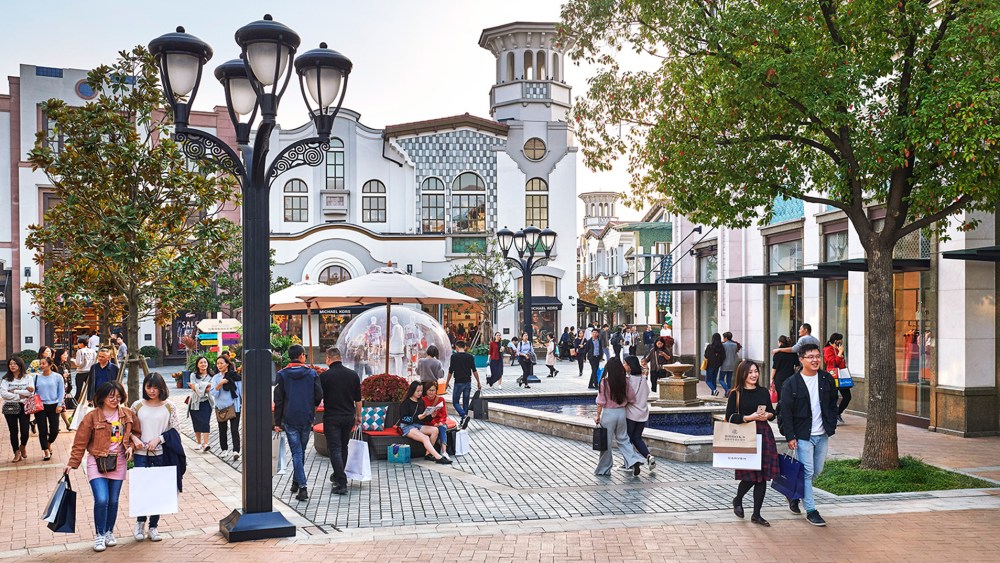LONDON — Retail tourism fuels China‘s domestic consumption growth, according to a new report by the China Tourism Academy under the Data Center of the Ministry of Culture and Tourism, and Value Retail, owner of the Bicester Collection Villages.
Based on a survey of 3,435 participants, the report showed that experiential consumption is becoming more prominent in China, with the shift from “tourism shopping” to “retail tourism” emerging as a leading trend.
Nearly 95 percent of respondents said they engaged in shopping during their travels. More than one-third of tourists indicated that they shop more while on trips. More than 70 percent of tourists took shopping into account when making travel decisions and had specific shopping plans. The majority of overall spending is concentrated between 2,000 renminbi and 5,000 renminbi, or $280 and $702.
The report concluded that consumers’ expectations for shopping among Chinese consumers go beyond merely acquiring goods. They are seeking more diverse, theme-driven and deep experiences.
You May Also Like
Retail tourism destinations that offer enhanced cultural experiences, listen to visitor feedback, integrate upstream and downstream supply chains, and embrace digital technology are more attractive than those that stay with purely shopping-oriented experiences.
Bicester Village Shanghai and Bicester Village Suzhou, two of Value Retail’s key projects in China, were used as case studies in the report to showcase the importance of shopping as a critical component of tourism.
The Bicester Collection, which originated in 1995 in Oxfordshire, U.K., now operates 12 shopping villages worldwide. It entered the Chinese market in 2014. The Suzhou location is located on the historic banks of Yangcheng Lake, while the Shanghai outpost is adjacent to the Shanghai Disney Resort.
Overall, the Bicester Collection welcomed nearly 50 million guests in 2023. The two villages in China were top performers, with combined visitor numbers increasing by nearly 30 percent compared to 2019 levels, sales revenue soaring more than 100 percent and average spend per visit rising by 80 percent in the period.
China’s recent economic slowdown may have contributed to the rising popularity of value-driven retailers like Value Retail, but the report also noted that a significant number of tourists said they would produce content around tourism shopping and “share on social media platforms such as WeChat Moments, Douyin, Weibo, Xiaohongshu and Kuaishou.”

The report — aimed as a call to action for industry stakeholders, including government departments, enterprises and institutions to collaborate in creating high-quality retail tourism experiences in China — was unveiled at the 2024 Retail Tourism Industry Development Forum, held Thursday at Bicester Village Shanghai with local government officials and Mark Israel, co-chairman of Value Retail China, in attendance.
Israel said over the past decade, the Bicester Collection villages in China have been focused on creating destinations that offer “world-class shopping and memorable experiences,” with strong hospitality offerings and well-designed landscapes.
“Looking ahead, we will continue to strengthen partnerships with airlines, hotels and travel service providers to advance the high-quality development of shopping tourism in China,” he added.
Dai Bin, president of the China Tourism Academy, said prime tourism destinations such as Bicester Village Shanghai and Bicester Village Suzhou illustrate the importance of the role of commercial forces and market mechanisms in fostering growth and meeting the plan for the development of the tourism industry during the 14th five-year plan period, which runs from 2021 to 2025.
The report said the State Council of China has introduced measures to support the establishment of cultural and creative product sales areas in cultural and sports venues. The Ministry of Culture and Tourism has also released policies aimed at enhancing the creativity of tourism products and the development of cultural and creative offerings.



